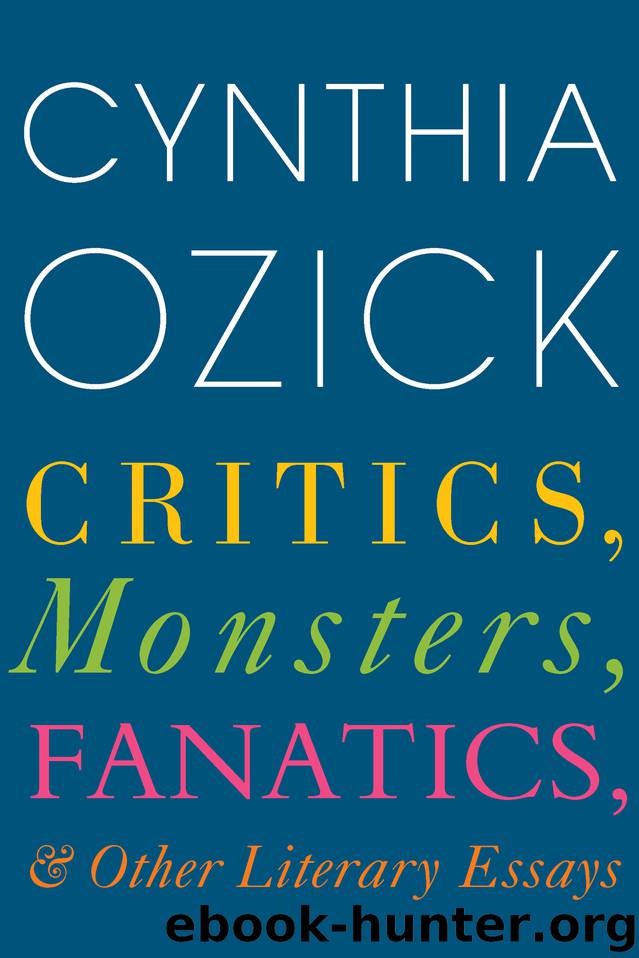Critics, Monsters, Fanatics, and Other Literary Essays by Cynthia Ozick

Author:Cynthia Ozick
Language: eng
Format: epub
Publisher: Houghton Mifflin Harcourt
Transcending the Kafkaesque
How, after all, does one dare, how can one presume? Franz Kafka, named for the fallen crown of a defunct empire, has himself metamorphosed into an empire of boundless discourse, an empire stretched out across a firmament of interpretation: myth, parable, allegory, clairvoyance, divination; theory upon thesis upon theophany; every conceivable incarnation of the sexual, the political, the psychological, the metaphysical. Another study of the life? Another particle in the deep void of a proliferating cosmos. How, then, does one dare to add so much as a single syllable, even in the secondary exhalation of a biography?
One dares because of the culprits. The culprits are two. One is “Kafkaesque,” which buries the work. The other is “transcend,” which buries the life. A scrupulous and capacious biography may own the power to drive away these belittlements, and Reiner Stach’s mammoth three volumes (only the second and third have appeared in English so far) are superbly tempered for exorcism. With its echo of “grotesque,” the ubiquitous term “Kafkaesque” has long been frozen into permanence, both in the dictionary and in the most commonplace vernacular. Comparative and allusive, it has by now escaped the body of work it is meant to evoke. To say that such and such a circumstance is Kafkaesque is to admit to the denigration of an imagination that has burned a hole in what we take to be modernism—even in what we take to be the ordinary fabric and intent of language. Nothing is “like” “The Hunger Artist.” Nothing is “like” “The Metamorphosis.” Whoever utters “Kafkaesque” has neither fathomed nor intuited nor felt the impress of Kafka’s devisings. If there is one imperative that ought to accompany any biographical or critical approach, it is that Kafka is not to be mistaken for the Kafkaesque. The Kafkaesque is what Kafka presumably “stands for”—an unearned and usurping explication. And from the very start, serious criticism has been overrun by the Kafkaesque, the lock that portends the key: homoeroticism for one maven, the father-son entanglement for another, the theological uncanny for yet another. Or else it is the slippery commotion of time; or of messianism; or of Thanatos as deliverance. The Kafkaesque, finally, is reductiveness posing as revelation.
The persistence of “transcend” is still more troublesome. What is it that Kafka is said to transcend? Every actual and factual aspect of the life he lived, everything that formed and informed him, that drew or repelled him, the time and the place, the family and the apartment and the office—and Prague itself, with its two languages and three populations fixed at the margins of a ruling sovereignty sprawled across disparate and conflicting nationalities. Kafka’s fictions, free grains of being, seem to float, untethered and self-contained, above the heavy explicitness of a recognizable society and culture. And so a new and risen Kafka is born, cleansed of origins, unchained from the tensions, many of them nasty, of Prague’s roiling German-Czech-Jewish brew, its ambient anti-Semitism and its utopian Zionism, its Jewish clubs and its
Download
This site does not store any files on its server. We only index and link to content provided by other sites. Please contact the content providers to delete copyright contents if any and email us, we'll remove relevant links or contents immediately.
| Ancient & Classical | Arthurian Romance |
| Beat Generation | Feminist |
| Gothic & Romantic | LGBT |
| Medieval | Modern |
| Modernism | Postmodernism |
| Renaissance | Shakespeare |
| Surrealism | Victorian |
4 3 2 1: A Novel by Paul Auster(12354)
The handmaid's tale by Margaret Atwood(7727)
Giovanni's Room by James Baldwin(7301)
Asking the Right Questions: A Guide to Critical Thinking by M. Neil Browne & Stuart M. Keeley(5741)
Big Magic: Creative Living Beyond Fear by Elizabeth Gilbert(5726)
Ego Is the Enemy by Ryan Holiday(5392)
The Body: A Guide for Occupants by Bill Bryson(5065)
On Writing A Memoir of the Craft by Stephen King(4919)
Ken Follett - World without end by Ken Follett(4705)
Adulting by Kelly Williams Brown(4552)
Bluets by Maggie Nelson(4534)
Eat That Frog! by Brian Tracy(4499)
Guilty Pleasures by Laurell K Hamilton(4422)
The Poetry of Pablo Neruda by Pablo Neruda(4079)
Alive: The Story of the Andes Survivors by Piers Paul Read(4009)
White Noise - A Novel by Don DeLillo(3990)
Fingerprints of the Gods by Graham Hancock(3979)
The Book of Joy by Dalai Lama(3959)
The Bookshop by Penelope Fitzgerald(3827)
